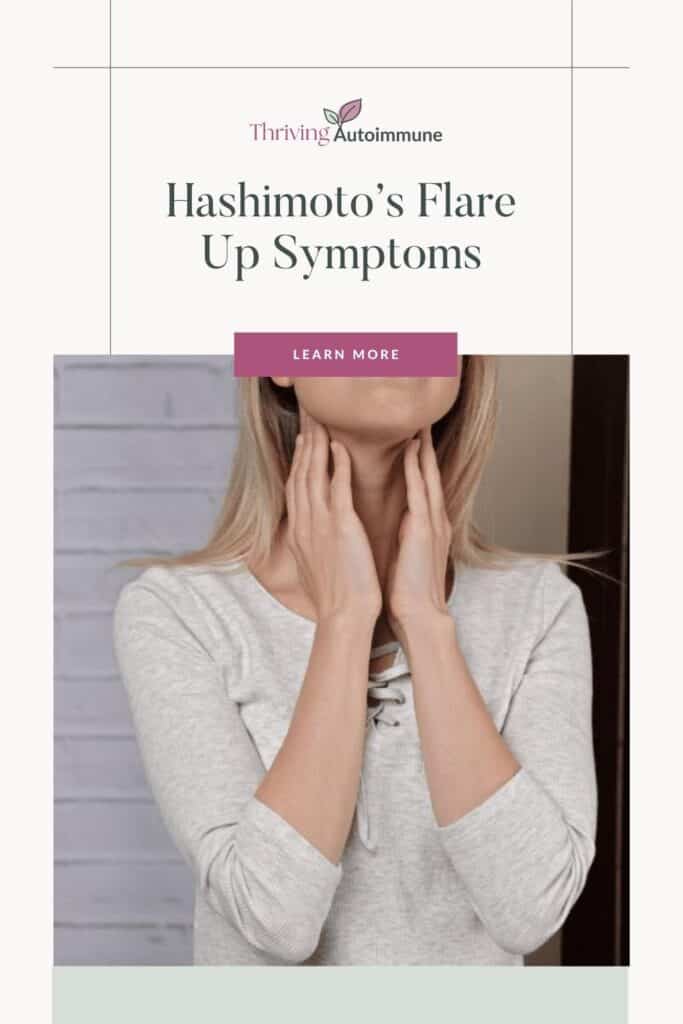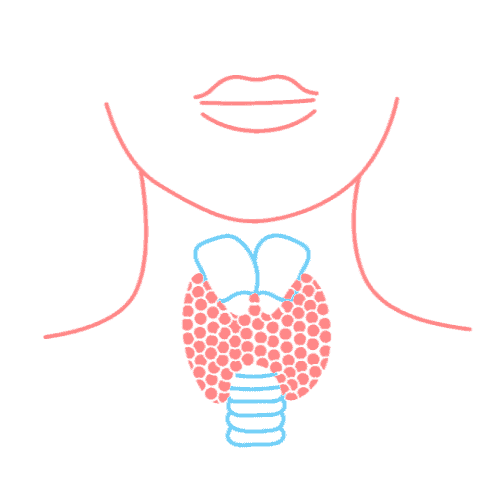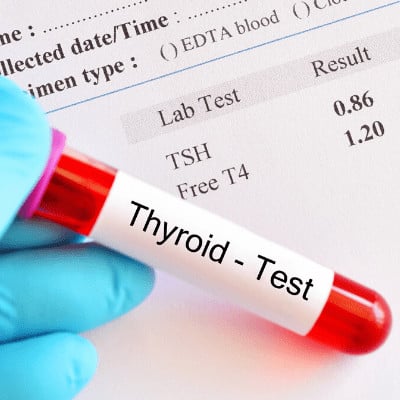This post may contain affiliate links. Please read my disclosure policy.
Are you wondering what are the common Hashimoto's flare up symptoms? In this post I share the common symptoms that many suffer from and how to know if you're having a flare. Hashimoto's flares can be scary – and so random, so don't suffer without having the peace of mind that you aren't alone in your symptoms. Plus – why medications don't necessarily help with a flare.

Due to how much my post Dealing with A Hashimoto's Flare has struck a chord with so many people, I wanted to offer this post as well so you can see what the Hashimoto's flare up symptoms are.
Because it's such an ambiguous autoimmune disease without any particular defineable A, B, and C symptoms, it's often helpful to hear what others experience so that you can feel a bit better knowing you aren't alone.
What Makes Hashimoto's Symptoms Unique
Most people, at least in the US and other developed countries, do not get glandular hypothyroidism or hyperthyroidism (though it can happen, and there are some other forms too, like temporary postpartum hypothyroidism).
Instead, most people with hypothyroidism actually have an autoimmune form of thyroid disease called Hashimoto's thyroiditis, or at least their hypothyroid/hyperthyroid is rooted in autoimmune disease. Many cases of hyperthyroidism are rooted in Grave's Disease. (In third world countries it's more common to suffer from a lack of iodine and the root cause is truly glandular)

Why Is It Important That It's Autoimmune?
This is important because people tend to start feeling symptoms of either hypothyroidism or hyperthyroidism when they first see a doctor, and the doctor will diagnose them with one of these – but it doesn't tell the whole story.
When you first go to see a doctor with symptoms, they typically run a TSH (Thyroid Stimulating Hormone) test.
If you have abnormally low TSH, the doctor will diagnose you as “Hyperthyroid”.
If your TSH is high, then you're “Hypothyroid”.
Usually at that time your symptoms even line up with these lab results and diagnoses. For instance, if you were to go read an article about “Hypothyroid symptoms”, you'd agree with many, if not all.
However, as time goes on, people usually start to feel symptoms of BOTH hypothyroidism AND hyperthyroidism.
This gets confusing because your test results say one thing and you're typically on medication to help with the condition, but you're experiencing something totally different than what you'd expect.
Why Do You Feel Both Types of Symptoms?
This happens because your disease is autoimmune in nature, which means you have a progressive disease raging on in your body that is not being healed, no matter what dosage of medication you're on.
Just looking at TSH and diagnosing as hypothyroid or hyperthyroid looks at one small piece of the whole puzzle.
People with Hashimoto's often experience symptoms of both Hypo- and Hyperthyroidism, as well as many other symptoms that are common to autoimmune disorders in general.
List of Hashimoto's Flare Up Symptoms
This list below are the common symptoms that someone suffering from Hashimoto's thyroiditis may experience. There are others that aren't on this list, but these are the ones I've found to be most common amongst the clients I've worked with and those in my community.
If you prefer to watch rather than read, this full-length YouTube video details all of the Hashimoto's flare up symptoms as well:
These symptoms are common if you've not done anything at all or if you've treated your disease with medication, and are also common flare up symptoms even if you've put your disease into remission (typically through diet and lifestyle changes).
Physical Hashimoto's Symptoms
Cold hands and feet – this one's pretty self explanatory, but you may notice your hands and feel getting cold all the time, or you always need socks and/or gloves
Intolerance to cold or heat – many with Hashi's just generally are colder than other people and may need to pile on sweaters, coats, and blankets even if it's 90 F out. Or the opposite may occur, where heat just wipes them out faster than anyone around them
Excessive hair loss – this can be from your head or body but most likely involves a lot more hair than usual. This also includes thinning eyebrows and eyebrows that won't grow back.
Dry hands and feet or dry skin in general – a higher fat diet can help with this, but this is a common symptom
Extreme fatigue – This is one of the most common yet worst symptoms of Hashi's – this exhaustion doesn't get better with sleep, no matter how much sleep you get. Often people with Hashimoto's can sleep 12-15 hours a night plus naps and still feel tired – and it's a bone deep tiredness.
Heavy or nonexistent and/or Irregular Periods and Menstrual Cycles – Heavy periods are not fun (I know from experience) and women with “normal” periods gasp at the amount of blood loss you might suffer from (it's so heavy it can be measured in cups, not ounces). In addition, the number of days in your cycle can vary greatly from month to month, and spotting in between periods can be quite common as well. Sometimes women experience nonexistent periods, but it is more common for them to lean towards the excessive side.
Body aches and joint pain – These can range from vague aches to acute painful aches, and the joint pain can be similar to arthritic pain. It seems to migrate sometimes – one day in your hands, the next in your knees, the next in your teeth, and so on…
Heart Palpitations – These can include skipped or racing heart beats, and they sometimes come in clusters. **It's very important to get checked out by a cardiologist though to make sure there is no underlying issue with your heart.
Weight gain or loss – This could go either way, and some people experience a greatly increased appetite.
Blood Sugar Crashes – When you feel shaky, irritable, “hangry” even with eating a low-sugar and otherwise healthy diet. (This is probably a normal occurrence if you eat a high-sugar diet, no matter if you have Hashimoto's or not)
Bulging Eyes – This is usually more of a hyperthyroid and Grave's Disease symptom but it can be found in those with Hashi's as well.
Mental or Mood Related Symptoms
Brain fog, hard to think – if you're not familiar with this, it's similar to how you might feel if you have a head cold and have a hard time thinking and concentrating. It feels like you're trying to wade through a marshmallow in order to understand something or answer a question. It may take you several times reading something to comprehend it, and often it's hard to understand anything complicated, no matter how it's delivered (audio, video, written, etc)
Memory loss – this include both short and long term memory loss. If you often go into a room and think “wait, why was I here?”, this could be due to this. Also a hard time recalling names or things you may have just heard or learned.
Restless sleep & Insomnia – If you DO get sleep, it may be a restless sleep and involve a lot of insomnia, especially around 2-3 am and lasting for several hours after.
Anxiety and panic attacks – these days almost everyone seems to suffer from anxiety because that's what our society seems to promote, but this is almost uncontrollable anxiety, where there may not even be a logical explanation or stressor but you just have constant, sometimes debilitating, anxiety that can turn into panic attacks
Depression or apathy towards life and everything in it – Hashimoto's can be a cause of these feelings
Mood Swings – With these you might go from happy to sad or irritated, and without any sort of event triggering the change. They feel almost uncontrollable.
General Autoimmune Disease Symptoms
The following symptoms are ones that seem to be issues with anyone suffering from an active autoimmune disease, not just Hashimoto's.
Inability to fight off colds and viruses – and it seems you pick up every one you come near. Most likely due to the fact your immune system is already fighting so much and not regulated to fight the “real” fires
Seasonal Allergies – again, your immune system is ramped up and the response to allergens can be exaggerated
Digestive Issues – This includes gas, bloating, constipation, diarrhea – can be any or all and most likely due to either a gut infection, gut microbiota being imbalanced, or leaky gut leading to food intolerances.
Dizziness or vertigo – This one is another one that feels like you have a head cold, but you may not have the other symptoms of a cold. It can be really low-grade dizziness too, not always super noticeable, but annoying nonetheless.
Irritability – this goes along with the mood swings, but it's very common with autoimmune disease
Malaise, Generally not feeling well, low-grade fevers – You constantly feel like you're coming down with something like the flu, but it never turns into anything. It's just a period of time of feeling “ugh” and there's no real explanation for why it's happening.
Adrenal Fatigue Symptoms -these include being tired at 3 pm and sugar cravings
Adult acne and pimples – I don't know anyone who wants zits, no matter how old or young you are! But it feels just unfair to get them when you're an adult and past all that puberty stuff.
My Own Hashimoto's Flare Up Symptoms
Sometimes it helps to hear of a particular case, and in my own case, I get a TON of these when I have a Hashimoto's flare up.
My typical ones are:
- heavy periods
- irregular cycles
- intolerance to cold
- hair loss
- adult acne
- heart palpitations
- brain fog
- poor memory recall
- ridiculous extreme fatigue
- insomnia
- joint pain that migrates throughout several parts of my body
- anxiety (though it's never been as bad as it was before I did the AIP diet)
- mood swings and irritability
- inability to fight of colds and viruses
- seasonal allergies
- gas, bloating
- dizziness
- low-grade fevers and general not feeling well
- adrenal fatigue symptoms
- and I also get a low-grade sore throat that lasts for weeks – I haven't found this to be very common though, so I didn't mention it above
As you can see, it's not very fun to have a Hashimoto's flare! That's why I keep my Hashimoto's under control as much as I can using the Paleo diet.
How to Know If You're Having a Hashimoto's Flare and Not Just Sickness
It sometimes can be confusing to know whether your symptoms are Hashimoto's flare up symptoms or you're just coming down with a cold/flu/virus or something else.
Time
The easiest way to determine this is to just give it time, as usually an acute illness like a virus will get worse quickly whereas Hashi's flares usually are a bit more slow moving.
It's important not to try not to freak out during this time and stress over whether you're having a flare or not – if you are, stress will only make it worse.
If you do think you're having one though, my post on dealing with a Hashimoto's flare might be helpful to read.
Thyroid Testing
Testing is the more accurate way of determining if you have autoimmune activity going on in your body.

The following are the tests that a doctor might run – be sure to ask for a “Full Thyroid Panel” if you want the antibody tests to be run as well:
TSH (Thyroid Stimulating Hormone) – this is the normal test that most doctors run that determines how much of the thyroid hormone T4 your thyroid is being asked to make. If your numbers are outside the lab normal ranges, then chances are you're having some sort of Hashimoto's activity in your body.
TPOAb (Thyroid Peroxidase Antibodies) – these will indicate if you have some sort of autoimmune activity against your thyroid
TGAb (Thyroglobulin Antibodies) – these will also indicate if you have some sort of autoimmune activity against your thyroid
Ultrasound – If the blood tests come back negative or if your doc wants to see more, they might do an ultrasound of your thyroid. There may be changes there that are consistent with Hashimoto's.
Needle biopsy – This is where cells are extracted from the thyroid via a needle and then studies under a microscope for signs of Hashimoto's. It's not a common way of determining Hashi's, but it can be something to use if no other test results show it.
To read more on thyroid testing, this article by Izabella Wentz is great.
Why Testing May Not Matter
Yes, it can be nice to have a piece of paper that says “You are in a Hashimoto's flare” and later see one that says you aren't.
However, if you're feeling these symptoms above and after a week or two have determined it's not from a cold or virus, and testing proves fruitless, I think it's more important to take measures to start reducing autoimmune activity in your body than to worry about a diagnosis.
Chances are, by reducing inflammation and immune activity, you'll start to feel better and the flare will calm down.
Note: If you're newly diagnosed or have never put your Hashi's into remission or felt better for a significant amount of time, check out my Start Here page as it will help guide you through what to do.
Why Medication Alone Won't Help Hashimoto's
Our bodies NEED thyroid hormones to work efficiently, and without sufficient quantities you'll never feel better.

Thyroid Medication Replaces Hormones
Therefore, it's very important to use replacement hormone medication (such as Synthroid, Levothyroxine, Armour, Cytomel, etc) if needed, as it will help replace the essential hormones your thyroid can no longer produce.
This will help you feel better and a lot of the symptoms above will go away as a result.
BUT – and this is a big but – the medications won't stop the progression of the disease in the background.
Wait What? The Disease Keeps Going?
You ever watch one of those movies where the thieves rig the security cameras to show a picture of the scene without anyone in it – so it looks like everything is ok?
Yet in the ACTUAL scene, they're wreaking havoc, stealing things, destroying things, etc?
That's how I see thyroid medications. They give you that false sense that everything is ok, but in reality, your immune system is having a destruction party.
The medications don't have the power to STOP the autoimmune disease, to stop your body from producing autoantibodies that attack and destroy your thyroid tissue.
That's why you may experience ups and downs all the time, good days and bad days, and fluctuations in your medication each month.
Eventually the medications don't even seem to help much at all, and you go to your doctor and they say there's not much they can do for you and/or it's “all in your head”.
What Works Then?
For many of us, changing our diets and lifestyle to a gluten-free, grain-free Paleo-style diet, with a LOT of stress reduction, emphasis on sleep and self-care, ideal amount of exercise, etc has done wonders, put our Hashimoto's into remission or at least made a significant improvement in symptoms, and reduced flare ups to very occasional situations.
The two best resources on my site to read are:
If you've already felt significantly better from your Hashi's and just experiencing a flare-up of symptoms, read Dealing with a Hashi's Flare
Also, if you're brand new to all of this, read the Start Here page, as it will guide you through all you need to know to help using diet and lifestyle changes to find relief.
Learn more about the Paleo & AIP Diets (my recommended diets for relieving Hashi's symptoms) via my Paleo & AIP Freebie Library.




I have pcos and hypothyroid. I constantly feel like something is wrong and my vision is getting blurry a lot, The doctor told me my ldl is 210 and I’m at risk of a heart attack or stroke at any moment. It runs in the family my dad died at 50 of a heart attack and my mom had strokes. I have been stressing a lot and I think that’s what’s making it worse. But this makes sense I’m going to talk to my doctor about this I’m hoping we figure something out soon….
I have had all these symptoms. I also have type 2 diabetes. My endo seems to ignore these symptoms. Should I ask her to do a complete thyroid blood test? I read that most doctors don’t do the T4 test and they miss the Hoshimoto diagnosis.
Any advise will be helpful. Thanks
If she will do a complete thyroid test then yes, have her do so. Many refuse to do so as they don’t think it changes anything, but insist – and ask for the antibody tests as well (thyroglobulin – TGAb and thyroid peroxidase- TPOAb). Those should be in a full panel but even so, sometimes they skip those. I really don’t understand why it’s so hard to get them to do it, but you have a right to get them done. If you have anything out of range with those antibody tests it suggests Hashi’s.
This was helpful and reassuring that I’m not crazy. Thank you!!
I am on hear to get info about flare ups. I am having trouble keeping my hashimots in remission and keep having to change my armour doses. It is up and down like a yoyo. I was keto for 1.5 yrs and carniver for 6 months. I guess I had some relief with more energy but didn’t lose much weight. Everything seems so impossible. A year ago we moved and i gave up on eating low carb. Moved to an area where it is hard to get the foods I need and decided to eat what I want.
I have all the symptoms plus i get the sore throats even before I started eating as i please, still mostly healthy but ice cream, cheetos, and a few cakes along the way. I’m trying to convince myself it will still be worth eating low carb. I have issues with oxalates also, it is so hard to determine what to eat because of leaky gut. I did better on carnivore but it is so hard for me to choke down meat all the time.
When i have a flare up, i didn’t even know there was such a thing, but now i can call it that, but the sore throat, and my ears will get sore also… it seems inflammation can hit eny where, but when it does, if i increase my vit D back up to 40k units and mk2 up to 400, and timed released vitamin c upt to 4000 mg a day my symptoms subside quicker.
so do you have issues with feeling like a plug was pulled and all strenght draining out of your body? Also last time we increased my Amour because tsh too high I got so shaky, out of breath and had to stay in bed. but now temp staying 94 f, symptoms of brain fog and such are worse…
WEll, thank you for you website and I will see what I can find to help myself. Blessing to you… I feel so lost right now and so tired of trying. Prayers right now and listening to soft spiritual music to try to sooth self.
I also have the sore throat symptom and throat clearing. A constant urge to clear my throat that can get super painful after an entire day. It’s the first symptom I get in a flare then everything else hits me after. Having herbal teas help as well as a warm pack on my throat.
Great article thank you!
MJ please go through recovery for your addiction. Get help. I have a granddaughter in icu right now that has hashimotos and was a user. Your system is already so stressed with autoimmune it you have it and the drugs may have very well caused it. Drugs break down the body’s defenses. It makes it so easy to catch infections. She is septic right now and it is a battle to bring her out of all of it because of the complexity of the autoimmune, Her lungs have been damaged by the autoimmune response, drug damage, infection and organ damage. And the liver plays such a vital part of life. Autoimmune can also attack the brain, they are calling in neurologist now because she is not rational at all. they finally got her off a ventilator after 10 days. Swollen eyes can also be an indication of kidney damage. I’m not a doctor though, but please go to a doctor, even if you don’t go through recovery… I am praying for your recovery and healing.
I need info on Hashimotos after tt. Thku.
As far as I know it would be the same – follow the diet and lifestyle changes but also make sure to take any medication, like thyroid replacement hormone, as that will be just as (if not more) important for you. It depends if your root cause was autoimmune or not as to how well the diet and lifestyle will help stabilize everything else, but I know a lot of people still feel symptoms after a thyroidectomy and use diet/lifestyle to feel stable and without symptoms.
Great article! Thank-you. I am having a hard time and this helps to motivate me, and also know I am truly going through something, it’s not just nothing, or no big deal, or can be ignored. Totally feeling deep bone tired…
Ugh, the bone-deep tiredness is so hard to deal with! Nothing seems to help you feel better, sleep, naps, taking days off, etc. Hang in there! Hope you feel better soon!
Thanks! I have a lot of these symptoms…2007 diagnosed with hashimotos after telling my Dr something was wrong, then I got a goiter in my throat went back and he says it’s my thyroid! 2 yrs of visits, had to get goiter for him to know what it is….he told me to diet, eat right. I was working out at gym all the time.finally got help! Etc….
So glad to hear you mention sore throat! This has happened to me twice in the past 6 months. The first time I went to the doctor and he put me on Zithromax. I “knew” I didn’t need antibiotics but I had no idea what was really going on. Then a few months later it happened again. I let it ride for almost two weeks and it gradually went away. Now I know the reason. And now I am more determined to stay on a Paleo diet.
It’s such a strange symptom! Yet it seems to be one of my most clear signals that I’m not taking care of myself, as if I ignore it and keep doing/eating what was causing me issues, I start flaring with all of my other symptoms shortly thereafter! So definitely something really helpful to know about yourself!
After reading your info , I am certain this is whats wrong with me and has been for over a year now! Ive had random weeks throughout the months where I wake up and my face is so swollen that I cant see for up to 45mimutes sometimes from my eyes literally swollen shut. When my face swells like that, its from 2 weeks to 2 months and Im so lethargic the entire time that theres no way possible I could actually work any kind of job! I am hesitant to see a doctor tho. I am a heroin addict and have been for over 14 years. Fortunately for me, youde never suspect or guess it from just looking at me. If i didnt tell you, youde never know or thats what im constantly told by almost everyone in my life. Like I said , Im very thankful for that but I do work hard to keep it that way and Im nowhere near what a person generally assumes a heroin addict to look and or act like. Theres no totally loaded, nodded out all day, half dead zoning out for me or my days. For many years now, I have been a maintenence user meaning my body has built up such a tolerance to the drug that I no longer get ” high” , “loaded” ect- I continue using to keep myself from being violently ill. So I basically use to feel normal and or well not to get “f’d up!” My point with all of this is that the health care professionals in this state are absolutely horrible to people like me. Really just taking judgemental to a whole new level. I havent met another user that would disagree at all with that either. What Im trying to get to or at with this is Im sure heroin doesnt help my thyroid issues at all- it probably makes it way worse- I get that Im just curious if maybe its at all possible to not tell.the doctor Im a user at all and just get treatment like anyone else for the hypothyroidism. My worries are that somehow the drug may affect any thyroid medication im prescribed anyway – essentially making it pointless for me to try and treat the thyroid issue. I m sure I sound like an idiot to alot of you. I am aware tha t drugs do not contribute to a healthy lifestyle. What can i say , Im an addict
Yes to the mild sore throat!!! This happens to me too. I just got over a sickness and a few days later it was like my sore throat and fatigue came back… was so confused until I realized the sickness probably caused a flare.